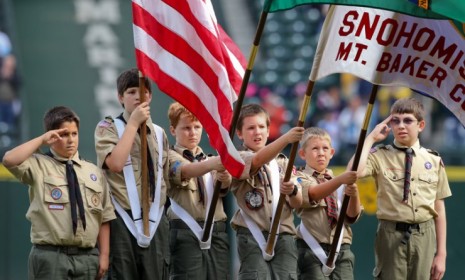4 reasons the Boy Scouts may regret banning gays
One of the nation's best-known youth organizations reaffirms its don't-ask-don't-tell policy, inciting a chorus of boos from gay-rights activists

A free daily email with the biggest news stories of the day – and the best features from TheWeek.com
You are now subscribed
Your newsletter sign-up was successful
The Boy Scouts of America announced on Tuesday that, after a confidential two-year review, the organization has decided to stick with its policy of excluding openly gay boys from becoming members and openly gay adults from serving as leaders. Despite public protests, BSA officials say that a broad internal review found extensive support for the ban. Two of the Boy Scouts' most powerful benefactors — the Catholic and Mormon churches — support the policy, which the Supreme Court upheld in 2000. Gay rights activists, however, say the controversy remains far from over, and argue that the Boy Scouts missed out on a chance to stay relevant in a changing and increasingly pro-gay-rights world. Will the Boy Scouts regret reaffirming the ban on gays? Here, four reasons it just might:
1. The Boy Scouts will lose desperately needed members
As society increasingly accepts gay rights, the Boy Scouts of America risks becoming a fringe organization that turns off socially liberal members, says James Dale, a former assistant scoutmaster who sued the Scouts after being forced out in 1990 because he's gay. The Scouts have 2.7 million members, but the number is declining, says Jeanne Sager at The Stir. Many kids and young parents these days think discriminating over sexual orientation is wrong. At this rate, "it's only a matter of time before the Boy Scouts runs out of people to peddle its narrow world view to."
The Week
Escape your echo chamber. Get the facts behind the news, plus analysis from multiple perspectives.

Sign up for The Week's Free Newsletters
From our morning news briefing to a weekly Good News Newsletter, get the best of The Week delivered directly to your inbox.
From our morning news briefing to a weekly Good News Newsletter, get the best of The Week delivered directly to your inbox.
2. The Scouts are contradicting their own message
The decision to reaffirm this policy was made by 11 people appointed to a secret committee, Eagle Scout Zach Wahls, son of an Iowa lesbian couple, tells BuzzFeed. "The very first value of the Scout Law is that a Scout is trustworthy," but "there is absolutely nothing trustworthy about unelected and unnamed committee members" making the decision to exclude people while hiding under a cloak of secrecy.
3. The protests will only get louder
BSA's move amounts to "a missed opportunity of colossal proportions," Human Rights Campaign President Chad Griffin tells Britain's The Guardian. BSA could have silenced accusations of discrimination by opening its doors a little wider. Now it's in for more of the protests that have tarnished its image, such as the 300,000-signature petition circulated by Jennifer Tyrrell of Ohio, who lost her volunteer job as her son's Cub Scout den mother once word got out that she is a lesbian.
A free daily email with the biggest news stories of the day – and the best features from TheWeek.com
4. Change is coming, anyway
Scout CEO Bob Mazzuca says the ban on openly gay Scouts and Scout leaders is the best policy for the organization, but "not all Scout executives agree," says James Johnson at The Inquisitr. Ernst & Young CEO James Turley and AT&T CEO Randall Stephenson, both members of the Scouts' national executive board, work for companies that have won praise from activists for their policies on gay rights. Both have vowed to make the Scouts more "gay friendly," and Stephenson might be in a position to deliver, soon. He's slated to take over leadership of the executive board in 2014.